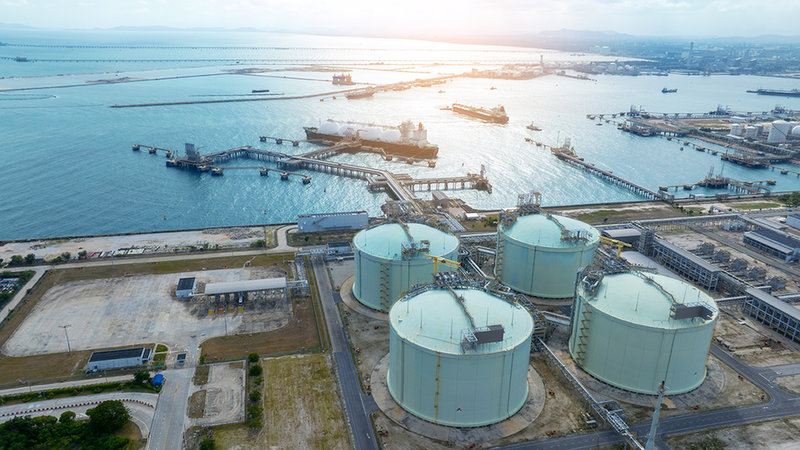Feature
The big picture: our energy sector outlook for 2024
From energy markets to electrification efforts and the race for net zero, Sonja van Renssen offers an outlook on our big topics for the coming year.

LGN terminal. Credit: Shutterstock
Neither the Hamas-Israel War nor Ukraine War show any sign of ending soon. Meanwhile, COP28 will remind everyone of the urgency of the net-zero agenda and elections are bringing to power populists who promise to make their countries great again. In volatile times, the one certainty is that energy will be expensive. As the new year unfolds, we will continue to bring you the news and analysis to help you make sense of 2024.
Miners have begun working to reduce their carbon footprint, but COP28 is set to demand further reductions across all industries.
Cleaning up the critical minerals supply chain
Critical minerals increasingly dominate the mining industry as well as global supply chains. We will pay special attention to them next year. Lithium, cobalt - where current production forecasts would cover just half of global demand in 2030 - nickel, rare earths, copper and graphite will all get dedicated GlobalData analysis and reporting. We will investigate demand for critical minerals in batteries and make the link to electric vehicle markets.
If the energy transition is increasingly shaping mining output, it is equally present in how companies mine. ESG and emissions from mining are coming under greater scrutiny as the sector increases its presence in ‘clean’ tech. Safety remains an ever-present concern; engagement with local communities is underway but there is more work to do; the environment is a further major challenge.
Grids are an emerging bottleneck to the further roll-out of renewables in some of the most advanced markets.
Miners have begun working to reduce their carbon footprint, but COP28 is set to demand further reductions across all industries, and water use and management present ongoing challenges - all the more so as climate change intensifies.
“In the near term, the switch to renewable power… presents the best opportunity to reduce carbon emissions,” said David Kurtz, head of research and analysis for energy, mining and construction at GlobalData, in an interview this autumn. In the medium term, he sees great potential in the switch from diesel to electric vehicles in the sector.
Electrification and infrastructure
Automation, AI and IOT provide further opportunities to bring down emissions and GlobalData will provide original analysis of what these and other technological advances mean for the power, offshore oil and gas and mining sectors.
The electrification of sectors like mining assumes a growing share of renewables in electricity generation. Big technologies like wind and solar will remain in our sights – including major challenges, such as permitting, that currently set their limits - but we will also explore more heavily debated low-carbon technologies like small modular reactors (SMRs) and biopower.
With oil and gas fetching high prices and companies shifting their corporate strategies to focus on this, rather than sustainability, at least in the short term, traditional markets and notably LNG will remain in the spotlight.
Grids are an emerging bottleneck to the further roll-out of renewables in some of the most advanced markets, and as well as the needed buildout of transmission and distribution grids, we will have on our radar: smart and microgrids; alternative balancing solutions like battery storage, demand response and smart meters; and hydrogen, both as a means of storing and transporting energy as well as an alternative feedstock and fuel to natural gas in, for example, heavy industry.
Oil and gas: traditional markets remain in the spotlight
The oil and gas sector is one of the big investors in hydrogen, as it would enable a reuse of existing infrastructure, and this industry is exploring the fuel and all its derivatives, including hydrogen-derived sustainable aviation fuels (SAF), ammomia and methanol. It is also promoting carbon capture and storage (CCS), and the use of captured carbon (CCU) in products to create a 'circular carbon economy'.
And, whilst it may come as a surprise to some, the oil and gas majors are eyeing electrification as a longer-term trend, and we expect to do more reporting on their diversification into critical mineral supplies and electric vehicle infrastructure. Did you know, for instance, that Shell is the single largest operator of EV charging networks in the UK?
That said, with oil and gas fetching high prices and companies shifting their corporate strategies to focus on this, rather than sustainability, at least in the short term, traditional markets and notably LNG will remain in the spotlight. Policymakers are striving to balance energy security and net-zero concerns.
Corporates are striving to balance shareholder expectations and long-term prosperity in a net-zero world. Expect venting and flaring, offshore electrification and digital technologies - including challenges like cybersecurity - to generate growing conversation.
COP28 in Dubai will attempt to strengthen language on a phasedown and ultimately phaseout of fossil fuels, but coal remains a staple of many energy mixes today. We will explore coal as a global commodity, including for example the future of coal mining in Australia, but also coal-fired power decommissioning.
The global view
Finally, our view is global, but we will be homing in on various markets in 2024. Elections for the European Parliament in June and the instalment of a new European Commission in autumn will kick off a new five-year political cycle in Brussels.
Debate about a 2040 climate target and how to get there has already started. In the US, D-day will be in November, with ex-president Donald Trump potentially retaking the White House. The UK, meanwhile, will be gearing up for a general election in January 2025.
We will also travel to Brazil, South East Asia, Japan, India, the Middle East, Australia, Norway, Germany, and China amongst others, for dedicated country-level reporting.
Whether it’s market, technology or policy-led, our dedicated team of energy reporters will tell you what you need to know to build your business in 2024 and beyond.